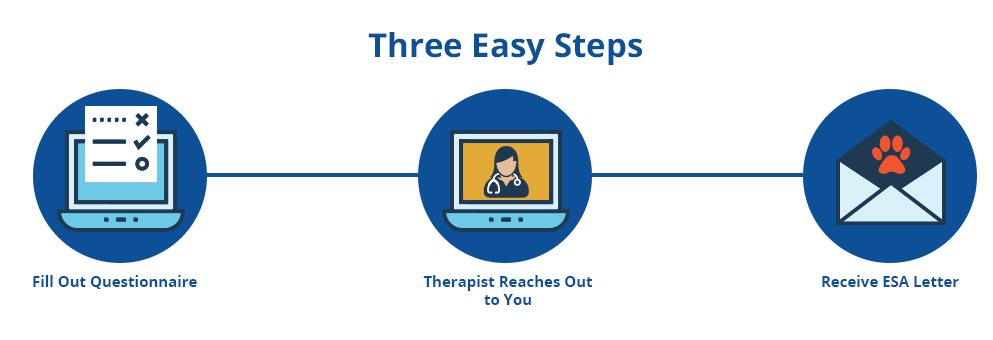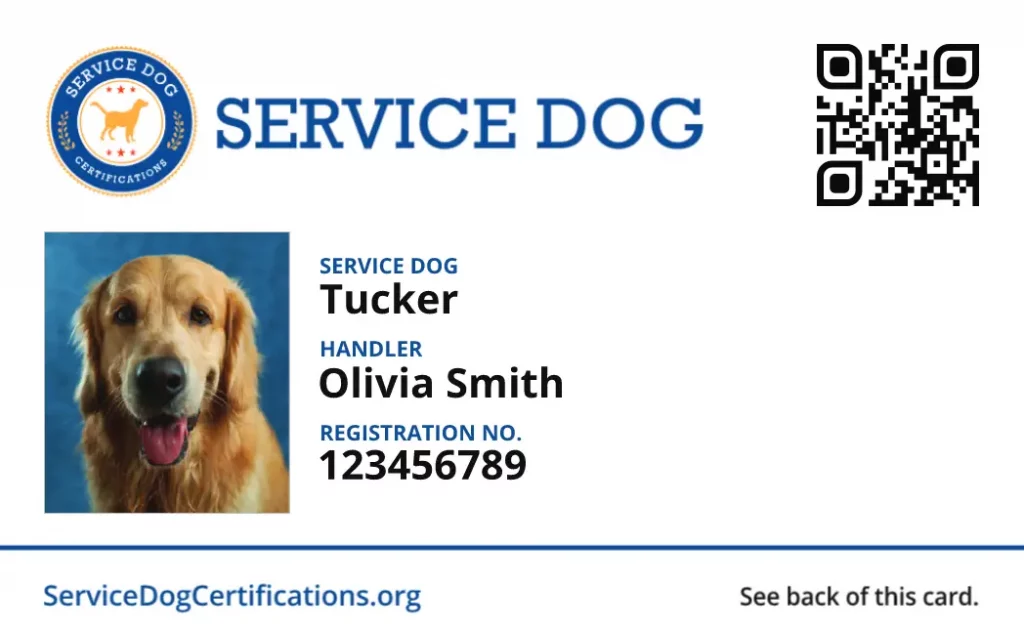Home Page › Blog › California Service Dog Requirements
California Service Dog Requirements

California allows people with disabilities to live, travel, and go about their daily lives in the presence of a service dog. Service dogs are afforded certain rights in the State of California that allow them to access public spaces that normally don’t allow pets.
Californians are protected by both federal and state laws, including under the Americans with Disabilities Act (ADA) as well as California’s Unruh Act (Civil Code, sections 51–51.2) and Disabled Persons Act (Civil Code, sections 54–55.32).
Read on for more information on California Service Dog requirements and regulations.
Definition of a service dog
Service Dog: Any canine trained to perform a disability-specific task for a person with a physical or psychiatric disability.
Service dogs used for mental health conditions are known as Psychiatric Service Dogs.
What is a disability: For legal purposes, disability is defined as a physical or mental impairment that substantially limits a major life activity (such as the ability to work, socialize, or attend school). Physical disabilities include health issues like limited mobility, visual impairment, seizures, and hearing loss. Qualifying psychiatric conditions include debilitating depression, chronic anxiety, PTSD, autism, and learning disabilities, among others.
How is a service dog trained?
To be considered a service animal, a dog must be individually trained to perform a job or task-specific to the handler’s disability.
Federal vs California rules: One difference between California’s rules and the ADA is that service dogs in training are not covered under the ADA. However, under the California Disabled Persons Act, individuals who train service dogs can bring their animals to any public place in order to train the dog and provide a disability-related service.
Who can train a dog: Dogs can be trained by the person with the disability, by a professional trainer, or with the help of a training organization. Note that in California, it is perfectly acceptable for a handler to train a service dog on their own.
Identification requirements for service dogs in California
Visible identification: Most service dog owners use service dog paraphernalia like ID cards, vests, tags, and certificates to signal to others in public that their dog is special. It is not mandatory either under California or federal rules to have an identification card or vest on your Service Dog, but handlers frequently use them for personal convenience. These items can prevent intrusive inquiries and unwanted interaction with the service animal while on duty.
Disability verification: Staff at venues and landlords cannot demand documentation as a condition of entry. In California, they can ask two questions to validate whether you have a service dog (and only if the disability is not obvious):
1. Is the animal a service dog required for a disability?
2. What work or task has the service dog been trained to perform?
Service dog registration in California
California does not require the registration of service dogs. There may be registration requirements that generally apply to all dogs that reside in your area, but they are not service-dog specific. Service dog owners, however, choose to voluntarily register their dogs for several reasons.
What it’s for: Registering a service dog with a service like Service Dog Certifications enters the dog’s information into a searchable database linked to an ID card. The ID card can be used as one way to signal to others that you own a service dog or be presented when third parties unaware of service dog verification rules continually insist on seeing documentation.
Psychiatric service dog requirements
Psychiatric service dogs are recognized as service dogs in California with all the same rights and benefits of ownership.
Psychiatric service dogs are still not well appreciated by the general public but are a growing category of assistance animals.
California considers the following as psychiatric disabilities if they substantially limit a major life activity:
- Post-Traumatic Stress Disorder
- Anxiety Disorders
- Depression
- Obsessive-Compulsive Disorders
- Personality Disorders
- Schizophrenia and Schizoaffective Disorder
- ADHD
- Autism
Psychiatric service dogs can perform an amazing number of tasks, including:
- Deep pressure therapy
- Reminding the owner to take medication
- Posting and watching the owner’s back in open areas
- Tactile stimulation
- Alerting the owner to oncoming threats or episodes
- Disrupting repetitive self-destructive behaviors
Service dog vs emotional support dog in California
California also recognizes emotional support animals as a type of assistance animal. An emotional support animal (ESA) alleviates symptoms of a mental or emotional health condition.
SD vs ESA: There are major differences between ESAs and service dogs.
- ESAs do not require any specialized training.
- ESAs are protected under the Fair Housing Act, not the ADA, so the benefits extend primarily to housing rights and do not come with public access rights.
- While service dogs can only be dogs, ESAs can be dogs, cats, birds, gerbils, fish, turtles, and other small household pets.
To qualify for an emotional support animal in California, you need an ESA letter from a California-licensed mental health professional. See if you qualify for an emotional support animal letter by completing the online questionnaire below.

You and your service dog in California
Service Dog handlers in California have generous rights. These include:
- Public access (venues, outdoor areas, etc.)
- Access to public transportation
- Access to aviation (including in the cabin on airplanes)
Having a service dog in California is a major responsibility. Properly training a service dog can be challenging, and service dog owners are expected to have their animals under control at all times. Of course, as a reminder, California law prohibits misrepresenting a pet dog as a service dog.
As a service dog owner, it’s important to be aware of your rights and how to conduct yourself during proper service dog verification requests by third parties. Registrations, certificates, ID cards, tags, and vests can’t replace these procedures, but they can help ease the process and give the public an easy way to recognize your companion as a service dog.
About the Author: The writing team at Service Dog Certifications is made up of folks who really know their stuff when it comes to disability laws and assistance animals. Many of our writers and editors have service dogs themselves and share insights from their own experiences. All of us have a passion for disability rights and animals.
135 comments
Leave a Reply Cancel reply
Latest Posts

How to Bring a Service Dog to Disneyland
Trained service dogs are more than welcome to join their handlers at Disneyland. In this guide, we’ll explain Disneyland’s policies and give practical advice for bringing a service dog to Disneyland for the first time. Disneyland’s Service Dog Policies The Magic Kingdom is happy to welcome trained service dogs across most park locations! They kindly […]

Read More

Can Dogs Eat Tomatoes?
Yes! Dogs can safely enjoy tomatoes, but there are a few risks to be aware of so you can feed your dog responsibly. Fully ripe tomatoes (without the stems and leaves) can actually have nutrients that are good for your pup. Tomatoes have chlorogenic acid, an antioxidant that can have anti-inflammatory effects in cells. They’re […]

Read More

Can a Primary Care Doctor Write an ESA Letter?
Your family doctor, also called a primary care physician (PCP), can write a letter recommending an emotional support animal. We’ll explain what legally gives them that ability and explore what better options might be available for you. Why are Physicians Able to Write an ESA Letter? To turn your pet into an emotional support animal, […]

Read More









Hello. 1st time to this site. I’ve trained my dog to help me. —In San Francisco (even an “Emotional Service Animal ) can come into restaurants, anywhere, no problem. But the California rules regarding Service dogs, notes an exception for all dogs in San Francisco. I didn’t know that. This morning I got a quick lesson that I wasn’t in “kansas” anymore—rules strictly enforced here in Davis, CA. I was stopped in local food co-op & questioned: “what is your disability?” “What service does she provide?” (The 1st question I felt was way too personal. So I answered, “A certified medical condition”. The young woman wasn’t content. She wanted to know precisely what was my disability. Grrrr. I’ve had my dog, for more than 3 years and never, ever was asked anything. She is polite. She’s earned her ” Good Canine Citizenship ” Certificate. — My feeling is that here in Davis, at least, people who have an untrained dog won’t be getting any privileges.
i have been told o er and over again that people are not allowed to ask what your disability is or ask your animal to perform that task. they can ask if she is registered. can ask if you have a need. i believe that’s it… in california. i don’t see why davis would be different… ?? just a thought. 🙂
That is against the law !
My German Shepherd is one year old this month. He has been through Profession Personal Training. And I have been Training German Shepherds my entire life. I am Disabled. With Nerve Nerophrapy. Hernias in all Disc in my Spine. I have a balance Problem. I’m on
Social Security Disability, in the State of CALIFORNIA. My Wife is my care Taker.
My German Shepherd helps me out of my Chair. Keeps me balanced. And help’s me walk. He is Wonderful at any store I take him into. My Medical Doctor Says He thinks it’s a good idea for me to have . My Service Dog License. Is this an easy Process to go through ?
You are not required to have a license as a service dog owner. The only license you may need is if the area you live in requires one for all dogs.
Emotional support animals are not service animals. Your dog does not have public access rights. Your dog is only allowed in long term housing and a plane.
Thanks for that! I’m doing some research on this, mainly because we hope to soon open a short term rental, and am appalled by the people who abuse & take advantage of designations for Service Animals just to get their PETS allowed… well, just about any place that people might be afraid to question them.
It IS allowed to ask if an animal is required due to a disability, and to ask what work or tasks the animal has been trained to do. That is even for Service Animals, which should be no problem for people with genuine disabilities to provide.
I would never have even considered questioning a person who said they required a Service Animal, and certainly didn’t realize there could be so many out there prepared to abuse or lie about that status! Now I’m not sure what to do. If someone is willing to stoop that low, it’s probable they’d be negligent in other ways, too. However, I’m planning to just give all the benefit of the doubt unless or until they prove themselves untrustworthy. I’d imagine those with disabilities who have Service Animals are the ones most disgusted by the fakers.
And then I see how just about anyone can “qualify” to have an Emotional Support Animal (ESA) by paying for a letter online. But for them, there is much less compliance required. Not only that, many states have enacted “fake Service Dog/Animal” laws, so beware if you’re one of the fakers out there.
So, you seem irritated because you’ve previously had “no problem” before, and I notice that you call your dog an “Emotional SERVICE Animal”. That’s your own label. Emotional Support Animals are NOT Service Animals, by definition. And just because you’ve gotten away with getting your pet wherever you’ve wanted before, no matter how “polite” she is, or how “Good” of a canine, doesn’t mean you can continue. Frankly, it’s an abuse and a lie to refer to her as a “Service” Animal at all. Those are specifically defined, and it certainly doesn’t sound like yours fits. Also, California is one of the states with a law making it a criminal offense to pretend to be the owner of a Service Dog, so be glad you weren’t cited.
Hi my son has multiple learning disabilities he is 7 and he gets really frustrated and angry at things i want to get him a service dog or emotional support dog . im not sure which one to get i would like to train the dog to help comfort him before he gets to angry or be there when he cries out from frustration.
If the main purpose of the dog is to comfort your son and the dog doesn’t need to be present at all times, an ESA would be sufficient. An ESA also requires less training but your son’s lmhp needs to approve the decision and write an ESA letter. You may find the chart on the different service animals in this article helpful https://www.servicedogcertifications.org/the-difference-between-a-psychiatric-service-dog-and-an-emotional-support-animal/
So who do I call to train my do in central California? Hes already an ESA but some housing places dont want to deal with that because ESAs aren’t covered through ADA. ONLY Service animals are.
Be CAREFUL in Finding A Traine
Do Research Ask Questions
I Trained Mine Myself
But I Had Plenty of Time !
Then I Found A Trainer Just To Give Me Advice
If You Want To Get Ahold Of Me On FB
Tammymaynelson From Sutter Ca
I’ve Been Trainning Dogs For Years Will Mentor if You Want
Some Places Want 5000 -30000 Dollars Even If Its A Non Profit Organation
Start with superb obedience training and get “Canine Good Citizen” from the AKC for starters.
Del Monte Kennel Club in Monterey area or other Kennel clubs if you are further away.
With the murder of my only son, I was given a small dog that helps me through each day without my son.. Will she qualify as an emotional support…
I’m very sorry to hear about your loss. In order to make your dog an ESA you need to connect with a licensed healthcare professional who is licensed in your state of residence. They will evaluate your mental health and decide if an ESA could be beneficial to the treatment of your condition. They will then issue an ESA letter which allows you to call your dog an emotional support dog. You may find this article on how to qualify for an ESA https://www.servicedogcertifications.org/how-to-qualify-for-an-emotional-support-animal/
Our Will highly recommended your center for dog training and boarding. So, whatever your problem, whatever your dog training needs, there are suitable options.Read on for more information on California Service Dog requirements and regulations.
I own a short term vacation rental. Am I required by law to allow service animals at my property
YES.
Based on what law? Short Term Rentals are a different animal than hotels and long term rentals, so you can’t definitively tell someone “YES” without knowing all the facts.
It depends. If you share space with guests, you are NOT required to allow them. But as someone preparing to open a short term rental, I would never deny a legitimate Service Animal for anyone. But then, I’m not allergic, so I suppose that might be a qualifying factor. I’m becoming a bit leery after reading about the high number of abusers, however, especially those who pay for letters & “certificates” online just to be able to bring their pets wherever they want. And I’m not even sure they can require you to accept animals if you’re not a public facility. I know some of the S.T. rental platforms have extra rules on the matter.
My daughter has speech delay and a learning disability (diagnosed) but we think she might need an emotional support dog since she has meltdowns quite often. I’ve been working with her doctor on getting information and a proper diagnosis so we can get her help (she’s 3 1/2 mind you) since a lot of people have suggested she get tested for autism (from mom’s who have kids with a form of autism) because she shows some signs of it. What do I need to do to get a dog/puppy trained and/or certified as an emotional support animal?
If your daughter does have autism she may qualify for a service dog. You may find this article on service dogs for autism interesting – https://www.servicedogcertifications.org/service-dogs-for-autism/